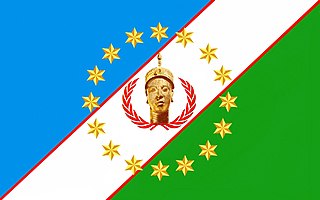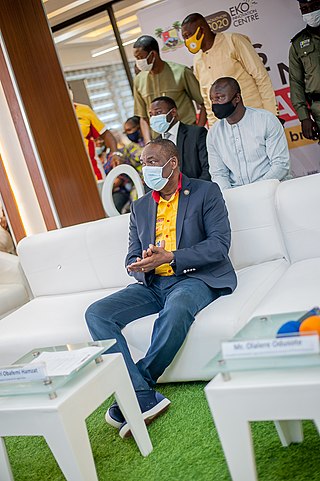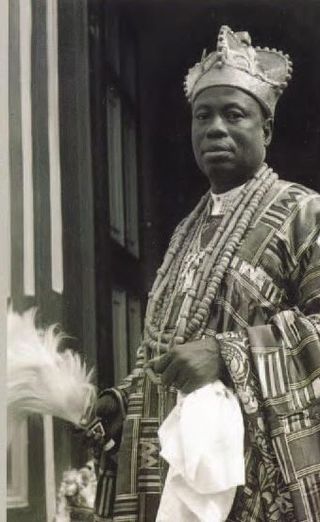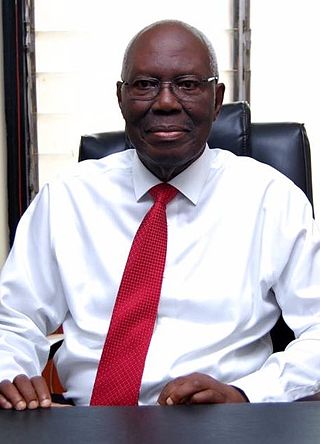Related Research Articles
Kabba is a town in Kogi State in mid west Nigeria. It lies near the Osse River, at the intersection of roads from Lokoja, Okene, Ogidi, Ado-Ekiti, and Egbe. The town is about 295 kilometers away from Abuja. It is 511 kilometers from Lagos.
Chief Hubert Adedeji Ogunde D.Lit. was a Nigerian actor, playwright, theatre manager, and musician who founded the first contemporary professional theatrical company in Nigeria, the African Music Research Party, in 1945.

Gbadamosi Adegoke Adelabu was a prominent personality in the politics of Ibadan city and subsequently that of the Western Region of Nigeria right before the country's independence in 1960. He was Nigeria's Minister of Natural Resources and Social Services from January 1955 to January 1956 and was later the opposition leader in the Western Regional Assembly until his death in 1958. He was a self-made man born into a humble family but became an influential figure in Nigerian politics. He attended Government College, Ibadan and eventually became a businessman. His successful political career was cut short when he was killed in a car crash, not long before Nigeria gained independence from Britain.
Egbé Ọmọ Odùduwà is a Nigerian political organisation established in 1945 by Yoruba leaders in London. Its initial purpose was to unite the Yoruba people in a manner similar to the tenets of the Ibibio State Union and the Ibo Federal Union. The organization grew in popularity from 1948 to 1951. In 1951, Egbé Ọmọ Odùduwà supported the formation of the Nigerian Political Party Action Group.
The Action Group (AG) was a Nigerian nationalist political party established in Ibadan on 21st March 1951, by Chief Obafemi Awolowo. The party was founded to serve as the platform for realizing his preliminary objective of mobilizing Western Nigerians to forestall the NCNC control of the Western Region and the subsequent aim of cooperating with other nationalist parties to win independence for Nigeria. It benefited immensely from the relationships developed in the Egbe Omo Oduduwa formed in Awolowo's days in London as a student.
Oba Sir Isaac Babalola Akinyele, KBE was the first educated Olubadan of Ibadan, and the second Christian to ascend the throne.
Oyinbo is an early Yoruba word used to refer to Caucasians. In the 1470s, the first Portuguese birth occurred in Eko, in Yorubaland, later called Lagos. The word was first used by the Yoruba to describe the Portuguese. It would later extend to all Europeans. Many years later, the word became used for anyone influenced by European tradition, customs, and culture, especially once-enslaved returnees. Oyinbo is generally used to refer to a person of European descent, Africans perceived to be not culturally Yoruba, or to people of any race considered light-skinned. The word is generally understood by most Nigerians and many other Africans.

Oloye Sir Adeyemo Alakija, was a Nigerian lawyer, politician and businessman. He served as a member of the Nigerian legislative council for nine years starting in 1933. In 1942, he became a member of the governor's Executive Council. Alakija was president of Egbe Omo Oduduwa from 1948 until his death in 1952.

Alimosho is a Local Government Area in Lagos State, Nigeria with the largest population of about 3,082,900 which is according to Population [2019] – Projection The 2006 Census says the population was 1,288,714.

The Awori is a subgroup of the Yoruba people speaking a dialect of the Yoruba language.The Awori people are the original inhabitants of Lagos State and some parts of Ogun State, namely Ado-Odo/Ota Local Government Area of Ogun State. The Awori people are landowners, farmers and fishermen.

The Yoruba people are a West African ethnic group who mainly inhabit parts of Nigeria, Benin, and Togo. The areas of these countries primarily inhabited by the Yoruba are often collectively referred to as Yorubaland. The Yoruba constitute more than 48 million people in Africa, are over a million outside the continent, and bear further representation among members of the African diaspora. The vast majority of the Yoruba population is today within the country of Nigeria, where they make up 15.5% of the country's population according to CIA estimations, making them one of the largest ethnic groups in Africa. Most Yoruba people speak the Yoruba language, which is the Niger-Congo language with the largest number of native or L1 speakers.

The Eyo Festival, otherwise known as the Adamu Orisha Play, is a Yoruba festival unique to Lagos, Nigeria. In modern times, it is presented by the people of Lagos as a tourist event and due to its history, is traditionally performed on Lagos Island. A notable festival date was in 2000 commemorating Justice G.B.A. Coker, a Lagos high chief, the Olori Adimu and the Olori Eyo of the Adimu Eyo cultural masquerade.
Egbe Mekun, popularly called Egbe, is a historic town located in the Yagba West local government area of Kogi State, Nigeria, West Africa.
Kofoworola Adekunle "Kofo" Abayomi was a Nigerian ophthalmologist and politician. He was one of the founders of the nationalist Nigerian Youth Movement in 1934 and went on to have a distinguished public service career. His last major public assignment was as chairman of the Lagos Executive Development Board from 1958 until 1966.

Kadri Obafemi Hamzat ; born 19 September 1964) is a Nigerian politician who has served as deputy governor of Lagos State since 2019.

Oba Sir Musendiku Buraimoh Adeniji Adele II, KBE was the Oba (King) of Lagos from 1 October 1949 to 12 July 1964.

Aso ebi (Yoruba), sometimes spelled as asoebi in Nigeria and ashobie in Sierra Leone and the Gambia, is a uniform dress or dressing code/style that is traditionally worn by the Yoruba People and acculturized by some other African cultures as an indicator of cooperation, camaraderie and solidarity during ceremonies, events and festive periods. The purpose of wearing the dress can be to serve as self-identification with age mates, relatives or friends during social occasions or funerals.

Ayọ̀ Bámgbóṣé is an academic linguist, the first professor of Linguistics in Nigeria. He has made contributions to education and linguistics, achieving recognition in form of honours and election to offices in professional bodies.

Olakunbi Ojuolape Olasope is a Professor in the Department of Classics at the University of Ibadan in Nigeria. She is an expert on Roman social history, Greek and Roman theatre, and Yoruba classical performance culture. Olasope is known in particular for her work on the reception of classical drama in West Africa, especially the work of the Nigerian dramatist Femi Osofisan.

Chief Isaac Oluwole Delano was a Yoruba and Nigerian writer, educationist, political activist, nationalist, radio broadcaster, teacher, and a pioneering linguist and lexicographer of the Yoruba language.